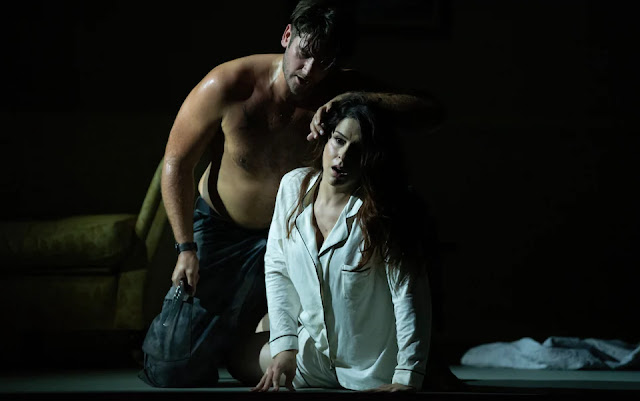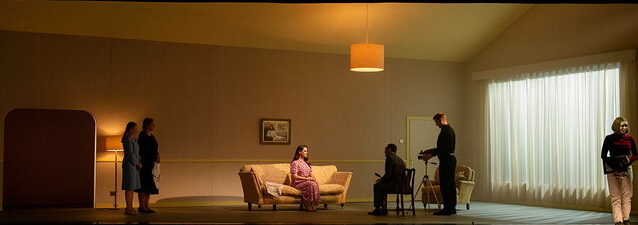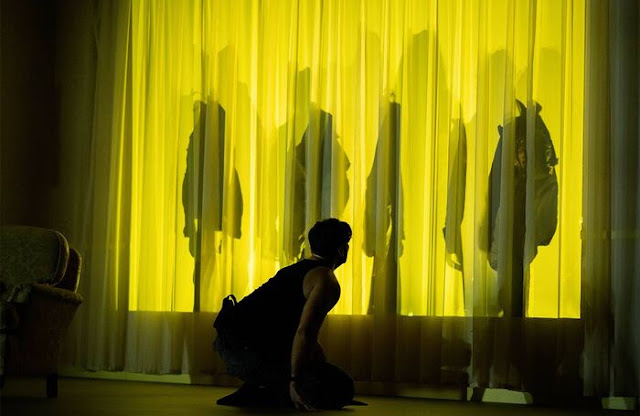 |
| Britten: The Rape of Lucretia - Jolyon Loy, Anne Marie Stanley (Photo Camilla Greenwell) |
Britten: The Rape of Lucretia; Anne Marie Stanley, Jolyon Loy, Anthony Reed, Kieran Rayner, Carolyn Holt, Sarah Dufresne, director: Oliver Mears, Aurora Orchestra, conductor Corinna Niemeyer; Linbury Theatre at the Royal Opera House
Performances of remarkable emotional depth from this young cast in Oliver Mears' sometimes disturbing modern dress production
Britten's The Rape of Lucretia, despite its undoubted element of genius, remains something of a dramatic challenge for directors. The basic question over the work is quite what we think of the role of the Male and Female Chorus, with librettist Ronald Duncan's added meta-layer of Christianity over the story. In many ways, it seems surprising that Britten, often profoundly fastidious when it came to opera libretti, set the text so unquestioningly, particularly as Britten's revisions to the opera (undertaken after the first performances) left this meta-layer intact. So, whilst the work gives a glorious opportunity for the contralto/mezzo-soprano singing the title role, the big question in people's minds before a new production is likely to be, how will the director handle the piece?
The new production of Britten's The Rape of Lucretia debuted in Aldeburgh at Snape Maltings before coming to the Royal Opera House's Linbury Theatre (where we caught it on 18 November 2022). The production is a collaboration between Britten Pears Arts and the Royal Opera with the singers being either Britten Pears Young Artists or Jette Parker Artists. The production is directed by Oliver Mears and conducted by Corinna Niemeyer with the Aurora Orchestra. Designs were by Annemarie Woods.
 |
| Britten: The Rape of Lucretia - Anne Marie Stanley, Anthony Reed (Photo Camilla Greenwell) |
The Male and Female Chorus were Michael Gibson and Sydney Baedke, with Anne Marie Stanley as Lucretia, Jolyon Loy as Tarquinius, Anthony Reed as Collatinus, Kieran Rayner as Junius, Carolyn Holt as Bianca and Sarah Dufresne as Lucia.
Mears' production was firmly modern dress and his approach to the opera brought in definite elements of contemporary war and violence, and the objectification of women, elements that are implicit in the opera. But by making the implicit explicit, Mears has to go against Britten's music at times. So that in the opening scenes, with the chorus' evocation of the background atmosphere, we see the men on manoeuvres and then their drinking scene is transformed into violent games played with a female prisoner. When we move to Collatinus and Lucretia's home, the lovely ensemble for the three women where each has a rather magical solo, expressing what they feel internally, is transformed into a media interview with the three of them, positioning Lucretia as some sort of media icon.
I could understand what Mears was getting at, but his methods seemed to leach some of the disturbing magic from the opera, we do not always want the implicit made explicit. It did not help that Britten's writing has an element of tradition about it, he mixes recitative, aria and ensemble albeit in his own distinctive way. Mears' completely naturalistic approach meant that the director had to find scenes of action for the ensembles instead of allowing the action to freeze, and there were moments when things seemed rather static.
 |
| Britten: The Rape of Lucretia - Linbury Theatre (Photo Camilla Greenwell) |
The set did not help. I would have liked to see it at Snape Maltings, but in the Linbury Theatre, Annemarie Woods' set came over as a rather strange letter-box shape, rather shallow and far too wide. It gave too much acting area across the stage and the singers had to work hard to fill it. Despite that theatre's relatively compact size, the work sometimes lacked the intimacy we wanted.
That said, the performances were very fine indeed, and Mears had drawn some very deep emotions from his young singers. Anne Marie Stanley was a profoundly moving Lucretia, poised and elegant in Act One and very moving in Act Two. Stanley kept her poise throughout and the way you sensed her holding things together in the terrible duet with Anthony Reed's Collatinus was profound indeed. So much so, that the tension rather slacked after her death.
We were never quite sure who the chorus were, contemporary Christians perhaps, certainly very involved and maybe even Lucretia's parents. But they were part of the action from the very beginning, rather than gradually being drawn in. Michael Gibson and Sydney Baedke were both finely expressive, and both used the words well, with Gibson in particular having superb diction. For much of the time they provided the right additional expressive layer to the action, but after Lucretia's death, Mears seemed to lose interest and despite fine performances from Gibson and Baedke the ending fell a bit flat.
 |
| Britten: The Rape of Lucretia - Jolyon Loy (Photo Camilla Greenwell) |
Physically imposing, Jolyon Loy's Tarquinius was fatally attractive and very aware of his charms, feeling himself infallible. Loy drew Tarquinius as someone whose lack of emotional intelligence meant that he could not believe he was not the object of attention, which led to his fatal step with Lucretia. It was a fine performance and a complex one because this Tarquinius was violent from the outset, yet Loy seduced us with his physical and vocal charms.
The role of Collatinus is relatively unimportant (he comes number three to Tarquinius and Junius in their Act One scene), but he certainly came to the fore in Anthony Reed's profoundly moving portrayal in Act Two. Kieran Rayner was a wonderfully two-faced Junius, egging Tarquinius on in Act One and despite strong emotion in Act Two, still using Lucretia's death for political purposes.
Lucretia's two servants, Bianca and Lucia, were finely portrayed by Carolyn Holt and Sarah Dufresne, providing discreet background support yet really holding our attention when the action focuses on them.
In the pit, Corinna Meyers and the Aurora Orchestra gave us a strongly characterised account of Britten's imaginative score. Meyers drew rich textures from her chamber forces (string quartet, single woodwind, harp, piano and percussion) yet kept the piece's feeling of litheness.
 |
| Britten: The Rape of Lucretia - (Photo Camilla Greenwell) |
What impressed me in this performance was the way Mears had drawn such deeply emotional and responsive performances from his young cast. All concerned were strongly drawn characters with a sense of complex involvement. A terrific achievement.
Never miss out on future posts by following us
The blog is free, but I'd be delighted if you were to show your appreciation by buying me a coffee.
Elsewhere on this blog
- What it means to perform Turangalila: pianist William Bracken shares his thoughts on Messiaen's Turangalila Symphonie in advance of performing it- feature
- Massive climaxes & mystical moments: Vaughan Williams' A Sea Symphony is the centrepiece of The Bach Choir's celebration at the Royal Festival Hall - concert review
- Unnervingly different: Icelandic experimental composer Guðmundur Steinn Gunnarsson's Landvættirnar fjórar - record review
- English music with a French accent: Ensemble Correspondances and Sébastien Daucé in Matthew Locke's Psyche - record review
- The friendship of Hector Berlioz and Théophile Gautier in song at the London Song Festival - concert review
- Any successful society has music at its core: pianist Iyad Sughayer on his new music academy in Jordan - interview
- Superb musical performances and theatrical dazzle do not quite add up to a satisfying staging of Handel's Alcina at Covent Garden - opera review
- Finally getting the recording it deserves: Meyerbeer's first French opera, Robert le Diable, from Marc Minkowsky, Palazetto Bru Zane and Bordeaux Opera - record review
- Joy and Devotion: Stephen Layton and Polyphony in seven UK premieres including Pawel Lukaszewski's mass dedicated to Pope John Paul II - concert review
- Music for the Moment: Haydn, Fanny Mendelssohn & Jessie Montgomery from the Kyan Quartet - concert review
- A radiant performance from Caroline Taylor as the Vixen lifts HGO's account of Janacek's The Cunning Little Vixen - opera review
- Cross-border cross-pollination: Halévy's opera based on Shakespeare's The Tempest proves to be ideal Wexford territory, if not quite a forgotten gem - opera review
- Home











No comments:
Post a Comment